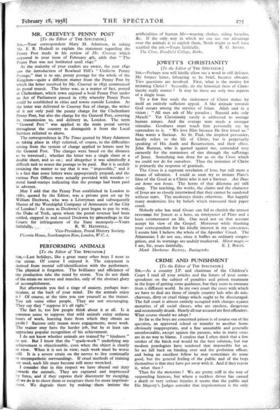JOWETT'S CHRISTIANITY
[To the Editor of THE SPECTATOR.] Sta,—Perhaps you will kindly allow me a word in self defence. My former letter, labouring to be brief, became obscure. Two questions are involved. First, what is the motive for imitating Christ ? Secondly, do the historical facts of Chris- tianity really matter ? It may be these are only two aspects of a single issue.
To a few fine souls the sinlessness of Christ makes by itself an entirely sufficient appeal. A like attitude towards God occurs among the mystics of Islam. Allah said in a vision : "All men ask of Me paradise ; Bayezid asks only Myself." Yet Christianity surely is addressed to average human nature. And the average man needs a stronger stimulus. Goodness must touch him personally ere he surrenders to it. "We love Him because He first loved us." Man wants a Saviour. So St. Paul, the inspired persuader, hardly refers to the life of Christ, but is perpetually speaking of His death and Resurrection, and their effect. John Bunyan, who is quoted against me, contended very earnestly for the remissions of sins through the sufferings of Jesus. Something was done for us on the Cross which we could not do for ourselves. Thus the imitation of Christ is primarily the response of gratitude.
The Cross is a supreme revelation of love, but still more a means of salvation. I could as soon try to imitate Plato's Idea of the Good as a Christ who is not a Saviour. Aut Deus out homo non bonus. The horns of that dilemma are still sharp. The teaching, the works, the claims and the character of Jesus are so closely intertwined that they cannot be sundered without tears. The modernist thinks otherwise. But happily' many modernists live by beliefs which transcend their paper creed.
Nobody who has read Greats can fail to cherish the utmost revereoge for Jowett as a hero, an intehpreter of Plato and a keen cormnentator on life. One need not on that account accept his view of the Gospel. Moreover while thanking your correspondent for his kindly interest in my conscience, I assure him I believe the whole of the Apostles' Creed. The Athanasian I do not use, since it baffles an ordinary congre- gation, and its warnings are unduly mediaeval. Miror magis.— I am, Sir, yours faithfully, E. J. Bows. Monk Sherborne Rectory, Basingstoke.










































 Previous page
Previous page